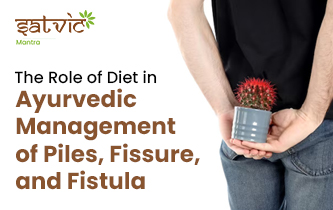Don’t miss to subscribe to our new feeds, kindly fill the form below.

 Chat with Us
Chat with Us

Introduction:
In the realm of Ayurveda, an ancient Indian system of medicine, the holistic approach towards health encompasses various aspects, including diet, lifestyle, and herbal remedies. Piles, fissures, and fistulas are common anorectal disorders affecting millions worldwide. While modern medicine offers treatments ranging from medications to surgical interventions, Ayurveda provides a unique perspective, emphasising the significance of diet in managing these conditions. In this article, we delve into the Ayurvedic principles guiding dietary recommendations for individuals grappling with piles, fissures, and fistulas.
Understanding Piles, Fissure, and Fistula:
Before delving into dietary interventions, it's crucial to comprehend the nature of the conditions we're addressing. Piles, also known as haemorrhoids, occur when the veins in the rectum and anus become swollen and inflamed, leading to discomfort, bleeding, and pain during bowel movements. Fissures are small tears in the lining of the anal canal, causing pain, bleeding, and sometimes spasms. Fistulas, on the other hand, are abnormal passages or tunnels that develop between the anal canal or rectum and the skin surrounding the anus. These conditions often result from various factors such as chronic constipation, straining during bowel movements, inadequate fibre intake, sedentary lifestyle, and genetic predisposition.
Ayurvedic Approach to Piles, Fissure, and Fistula:
Ayurveda, rooted in the principles of balancing the three doshas—Vata, Pitta, and Kapha—offers a multifaceted approach to managing anorectal disorders. Central to Ayurvedic treatment is the concept of "Agni," or digestive fire, which governs digestion and assimilation. When Agni is impaired, it can lead to the accumulation of toxins (ama) and aggravation of doshas, contributing to digestive issues and anorectal problems. Therefore, Ayurvedic interventions aim to restore balance to Agni and pacify aggravated doshas through dietary modifications, lifestyle adjustments, herbal remedies, and cleansing therapies.
The Role of Diet in Ayurvedic Management:
Diet plays a pivotal role in Ayurvedic management of piles, fissures, and fistulas. According to Ayurveda, incorporating the right foods can help alleviate symptoms, promote healing, and prevent recurrences. Here are some dietary guidelines recommended for individuals dealing with these conditions:
1.Fiber-rich Foods:
Adequate fibre intake is paramount in promoting regular bowel movements and preventing constipation, a common precursor to anorectal disorders. Incorporate fibre-rich foods such as fruits (especially papaya, figs, and prunes), vegetables (like spinach, broccoli, and carrots), whole grains (such as oats, brown rice, and quinoa), and legumes (like lentils, beans, and chickpeas) into your daily diet.
2. Hydration:
Proper hydration is essential for maintaining soft stools and facilitating smooth bowel movements. Drink plenty of water throughout the day, herbal teas, and soups to stay hydrated and support digestive function.
3.Warm, Nourishing Foods
Ayurveda advocates for consuming warm, cooked foods that are easy to digest and soothing to the digestive tract. Opt for soups, stews, cooked vegetables, whole grains, and herbal teas over cold or raw foods, which can exacerbate Vata imbalances.
4.Digestive Spices:
Incorporate digestive spices such as ginger, cumin, coriander, turmeric, and fenugreek into your meals. These spices not only enhance flavour but also aid digestion, reduce inflammation, and promote healing.
5.Probiotic-rich Foods:
Probiotics, found in fermented foods like yoghurt, kefir, sauerkraut, and kimchi, help maintain a healthy balance of gut bacteria, which is crucial for optimal digestion and immune function.
6.Avoid Trigger Foods:
Identify and avoid foods that may exacerbate symptoms or aggravate dosha imbalances. Common trigger foods include spicy, greasy, processed foods, caffeine, alcohol, and excessive intake of refined sugars.
7.Mindful Eating Habits:
Practise mindful eating habits, such as chewing food thoroughly, eating in a calm and relaxed environment, and avoiding overeating or eating too quickly.
8.Herbal Supplements:
Consider incorporating Ayurvedic herbs and supplements known for their digestive and healing properties, such as Triphala, Aloe Vera, Psyllium Husk, and Kutajarishta, under the guidance of a qualified Ayurvedic practitioner.
Conclusion:
Incorporating Ayurvedic dietary principles can play a significant role in managing and alleviating the symptoms of piles, fissures, and fistulas. By focusing on fibre-rich foods, hydration, digestive spices, and mindful eating habits, individuals can support digestive health, reduce inflammation, and promote healing from within. However, it's essential to remember that Ayurvedic treatments are holistic and personalised, and consulting with an experienced Ayurvedic practitioner is advisable to tailor the approach to individual needs and constitution. With the right dietary choices and lifestyle modifications, individuals can embark on a journey towards improved digestive wellness and overall well-being.
Share This News